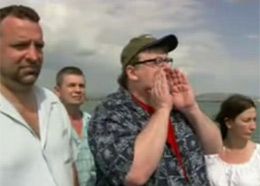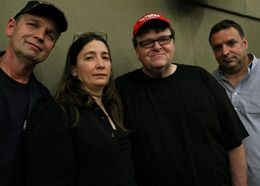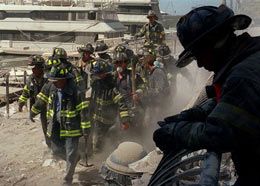| SiCKO Preview Clip | |
Michael Moore’s call for help  | |
|
By Jamie Thompson
EMS1 Staff
Like thousands of other Ground Zero volunteers, William Maher, Reggie Cervantes and John Graham have been afflicted with ailments ever since the time they spent responding following the attacks on 9/11.
As has been widely reported of late, the three are not alone in their struggle to pay for the care needed to treat their multiple conditions.
However, unlike the legions of other 9/11 responders, the trio found help from an unlikely source: Cuba.
Their plight is featured prominently in the new documentary entitled “SiCKO”, from controversial filmmaker Michael Moore who also made Bowling for Columbine and Fahrenheit 9/11. “SiCKO” takes a harsh look at the health care industry in the United States, with the climax focusing on Ground Zero responders.
The documentary follows them as they receive free treatment and tests at a hospital in Havana, following an aborted attempt to see doctors at Guantanamo Bay, where the terror suspects detained at the U.S. military base’s prison receive free health care.
“My whole focus of being in this is to try to get the message across to the federal government and the state governments to put all their political differences aside and put money forward for these guys who are dying every week,” Maher said.
At the time of the terrorist attacks, he was an engineer at Verizon and a volunteer firefighter in Maywood, N.J.
Relative died
In November of 2001, Maher found out his second cousin had been working in the World Trade Center when it was struck. His body was never found.
In his spare time, Maher spent the next few months as a volunteer, bringing supplies to the scores of rescuers still sifting through the rubble.
“When I was down there, I felt good,” he said. “When I stepped away from the place, I didn’t feel so good. If I could, I would have been there 24/7.”
About a year later, Maher said he began to develop respiratory problems. In addition, stress from the recovery work caused him to grind his teeth at night over the years that followed.
The persistent grinding caused so much damage that he needed major reconstructive dental work, which his personal dental plan did not cover. His health coverage with Verizon came to an end when he retired from the company in 2004.
Then, last year, Michael Moore came calling.
Maher and fellow “SiCKO” participant Graham, a volunteer EMT and rescue technician from Paramus, N.J. who spent several months at Ground Zero, got involved with the project via the FealGood Foundation, a non-profit organization that aims to spread awareness about the catastrophic health effects on 9/11 first responders.
Its president, John Feal, who has also suffered health problems since volunteering at Ground Zero, was approached by Moore’s film company when it was looking for people to appear in the documentary.
Initial reservations
Maher said he was initially unaware that Moore was involved in the film — and had reservations when he did find out.
“I had never seen a film of his before,” he said. “But a lot of people I knew disliked him; they said he was un-American. So, at first my opinion was based on other people’s.”
Maher said he was won over when Moore outlined his plans for the film, which looks at the private insurance system in the United States and the power wielded by pharmaceutical companies, as well as the treatment issues faced by 9/11 responders.
Although Maher, Graham and Cervantes are only featured toward the end of the documentary, it is their part in the film that has attracted most publicity — namely, the trip to Cuba.
 AP Photo/Tina Fineberg Michael Moore, second from right, poses for a photograph with Bill Maher, left, Reggie Cervantes, second from left, and John Graham following a special screening of SiCKO in New York in May. |
Authorities are now looking into whether Moore broke travel restrictions and the three responders said they also expect to be investigated.
But the trio said the trip was worth it — whatever penalties they may face.
They all underwent several days of extensive tests and treatment, all for no charge. In the film, Moore states they requested the same level of treatment that would be given to Cuban citizens - “no more, no less.”
Maher received extensive dental work, which he estimates would have cost $8,000 in the United States. Graham, who said he has struggled to receive treatment in the United States for severe pulmonary diseases and kidney problems, said Havana doctors also discovered a previously undiagnosed digestive problem.
Cheaper medicine
Cervantes, who has suffered pulmonary ailments, esophageal reflex, post-traumatic stress disorder, and ear and eye infections since volunteering at Ground Zero, saw nine different specialists — and returned with inhalers brought at fraction of the price in the United States.
“It was a big journey in terms of having to accept going to another country for health care,” Cervantes said. “That was a hard thing to swallow, and finding out that my medication is so overpriced here.”
Native New Yorker Cervantes, who now lives in Oklahoma, spent four days tending to the injured and dying as a volunteer EMT at Ground Zero after the terrorist attacks. In the years following, she has faced huge difficulties in getting treatment for the conditions she has since developed.
She became involved in the documentary after responding to an Internet posting by Moore, and said she hoped the documentary has a positive effect.
For the past four years, Cervantes has been an advocate for the 9/11 health care problems.
She said she saw the film as an opportunity to raise the issue in the national media, something she has struggled to do up to now.
“I hope that this will make people pay attention to the health care crisis in America,” she said. “I hope that as a result there will be some reform generally for the American public and there will be assistance for the dying and sick rescue workers.”
 AP Photo/Tina Fineberg Firefighters carry an injured fireman from the World Trade Center area on 9/11. |
During the Cuba adventure, the three also met firefighters at a Havana station, where crews were eager to welcome the Ground Zero responders.
“We didn’t go into it (Ground Zero) to receive accolades, to be heroes,” said Cervantes. “We went to do something were trained to do.
“But it was humbling when someone acknowledges your work, especially after we had endured such a different road at home.”
For Graham, it showed that firehouses are the same the world over.
“We spent a while there after the cameras had stopped,” he said. “They were making jokes at their lieutenants and the captains, the same as you would here.”











